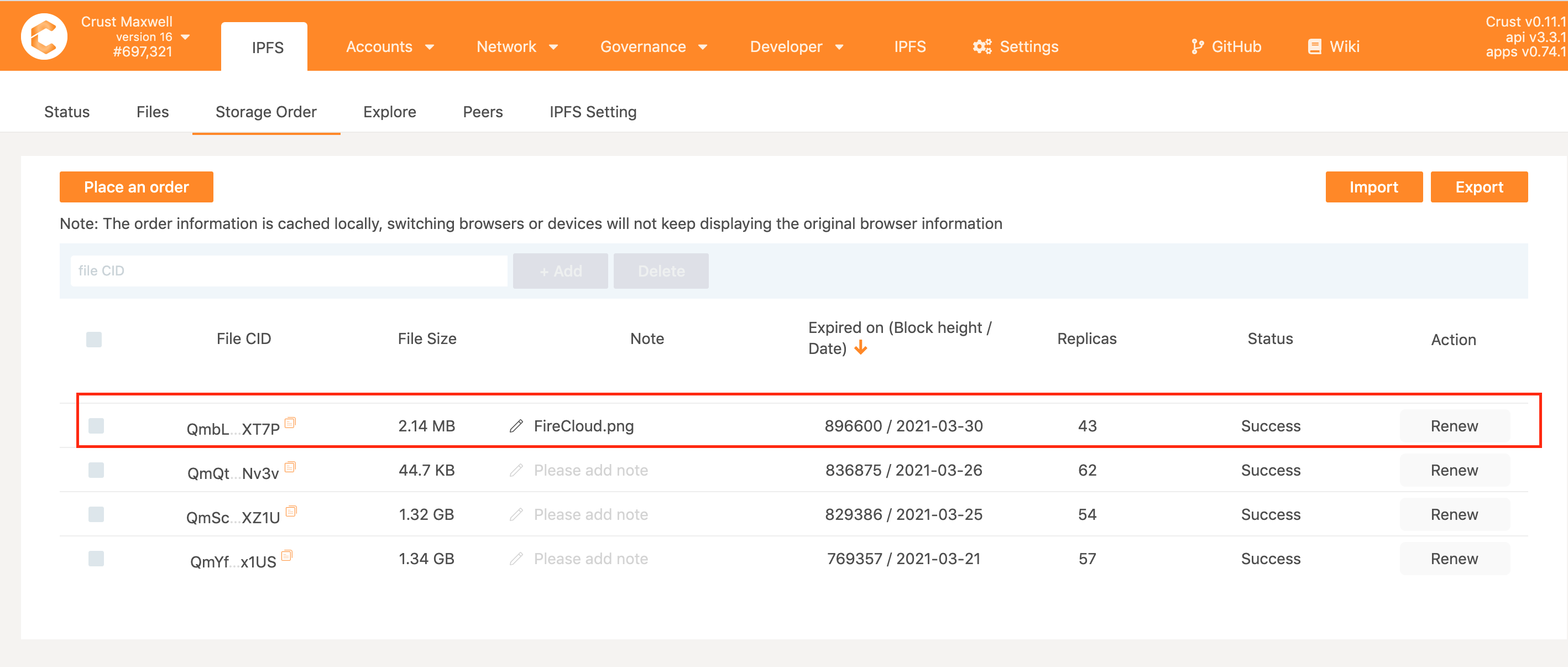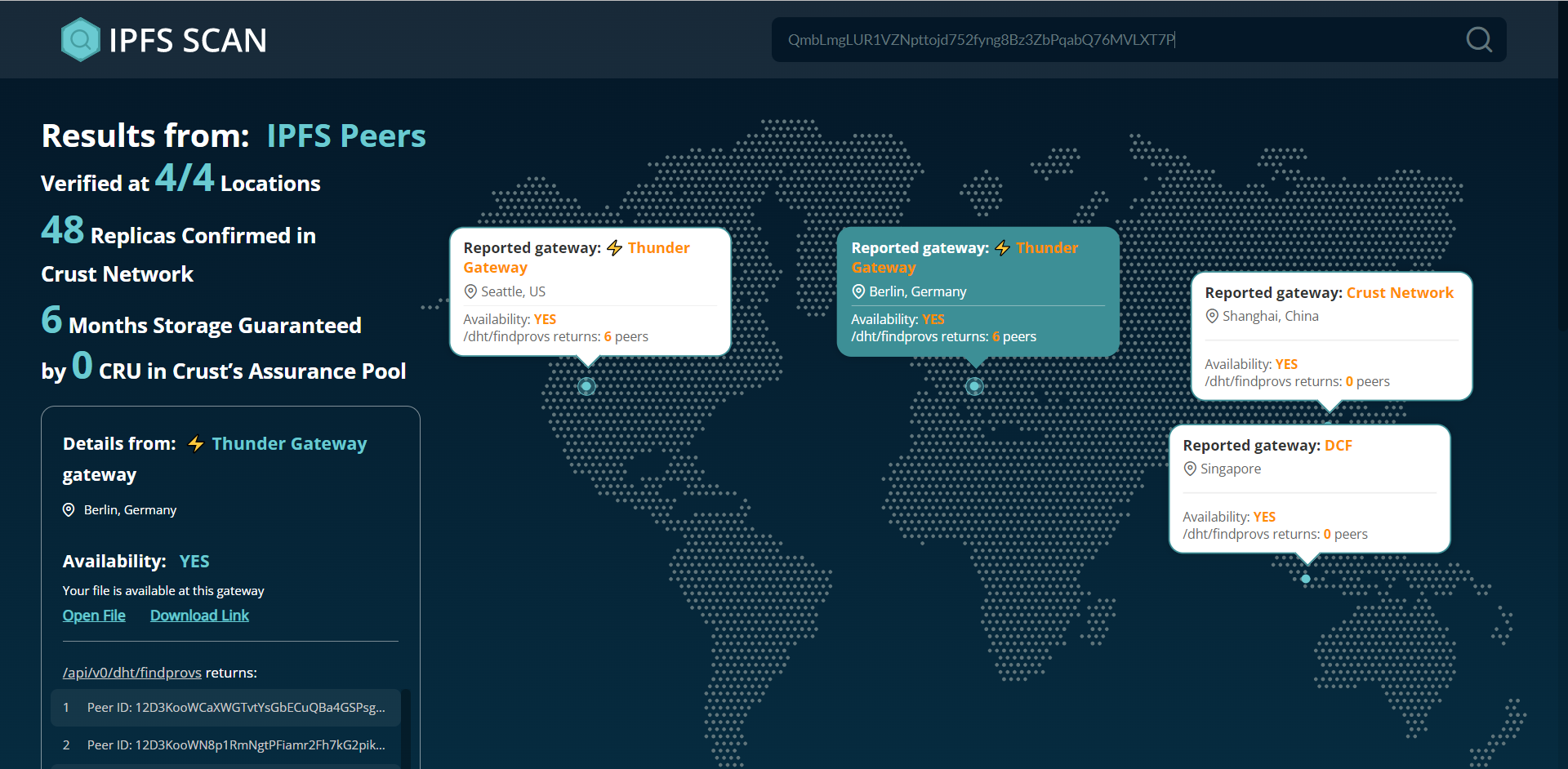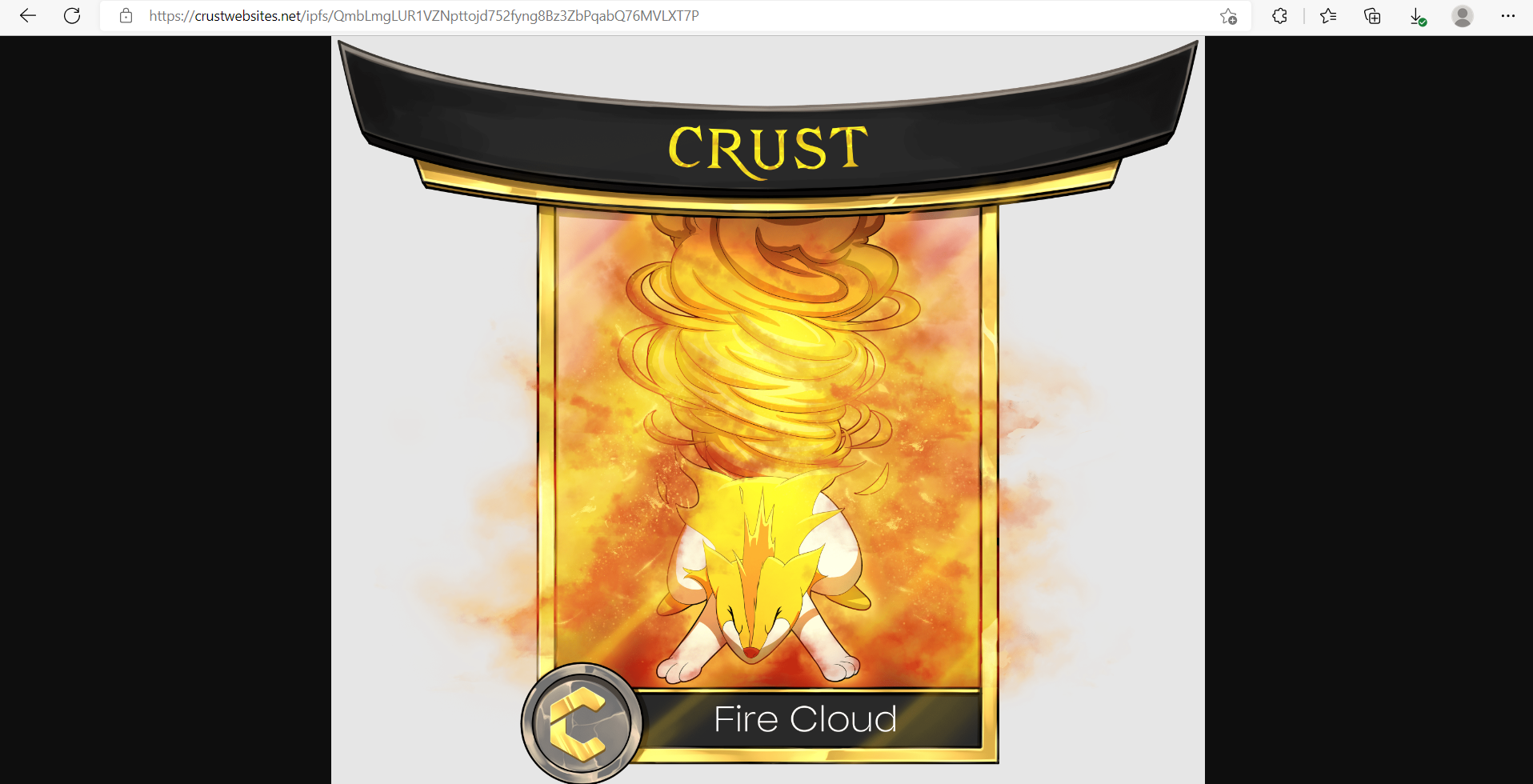NFTs
Overview
Non-fungible tokens (NFTs) are a way to prove ownership of digital art and collectibles. NFT assets, like artworks and collectibles which come to public eyes through multimedia files such as images and videos, are relatively expensive if stored on the blockchain and therefore need to be stored off-chain. SwitchSwap is an open sourced decentralized NFT minting platform based on IPFS, Crust and Polygon chain.
Note
- This article uses the NFT exchange as an example to illustrate the process of integrating Crust/IPFS network.
- The term "NFT files" is used to mean the multimedia files of NFT assets in this article.
Overview process
The NFT trading platform serves the storage needs of NFT files by integrating Crust and IPFS. The entire solution can be divided into four steps:
- Import NFT files into IPFS;
- Store and distribute NFT files through Crust Network;
- Monitor the storage status of NFT files in Crust Network;
- Users access NFT files in the NFT trading platform;
- Add money to auto-extend expired time of your NFT file.
Detailed process
1. Import NFT files into IPFS
Import NFT files into IPFS by Crust IPFS Gateway when NFT is generated
Choose an IPFS W3Auth Gateways
Use the following default Web3 Auth Header or create your own Web3 Auth Header by refering this doc:Get a Basic Authentication header
curl --location --request POST 'https://gw.crustfiles.app/api/v0/add?pin=true' --header 'Authorization: Basic c3Vic3RyYXRlLWNUTWo5NnlLUWZzM20yeWVZQjVQcGl6Sld5UFV1UkRmZnRNN2dnNkFMRG5xUjViSEs6MHhlNDU0NmM5Y2MwOWViODdiYzNkNGNjODcyMjk0YzA5MTAwNmMzZGJlYTI3ZTM0MWU3ZDc0Yzk3MjVhMGE1MzQ0NTM5ZDVkZGMwZDgxZGI5YWU3MDg4OTE0MTljNWFiM2NiM2YxYWNkYWQwMTk4MDc2MzVjNmU2ZTQzNmU4Njg4OQ==' --form 'file=@"/home/crust/FireCloud.png"'
Any file imported into IPFS gateway will be given a unique CID (anyone can retrieve the file on IPFS Network by this CID).
{
"Name": "FireCloud.png",
"Hash": "QmbLmgLUR1VZNpttojd752fyng8Bz3ZbPqabQ76MVLXT7P",
"Size": "2247325"
}
From the returned value, we can find the CID is: QmbLmgLUR1VZNpttojd752fyng8Bz3ZbPqabQ76MVLXT7P
2. Store and distribute NFT files via Crust Network
Once NFT files are uploaded into IPFS Network, we need the Crust Network nodes to pin the files and provide retrieval services so that the files are always accessible, .
2.1 Install dependencies
The NFT trading platform installs dependencies pertaining to Crust.
- @crustio/type-definitions customized types of data pertaining to Crust Network
- @polkadot/api promise-style interface provided by the polkadot api library for performing related actions on Crust chain
2.2 Initialize API instance
The NFT trading platform initializes the api instance on the server side so that it can interact with Crust Network.
import { ApiPromise, WsProvider } from '@polkadot/api';
import { typesBundleForPolkadot, crustTypes } from '@crustio/type-definitions';
// WS address of Crust chain
const chain_ws_url = "ws://127.0.0.1:9933";
// Connect to chain
const api = new ApiPromise({
provider: new WsProvider(chain_ws_url),
typesBundle: typesBundleForPolkadot,
});
2.3 Set on-chain identity
The NFT trading platform needs to obtain KeyringPair on the chain to be able to send order transactions. It can be generated from the seed files of an account:
/* eslint-disable node/no-extraneous-import */
import {Keyring} from '@polkadot/keyring';
import {KeyringPair} from '@polkadot/keyring/types';
// Seeds of account
const seeds = "echo xxxx soccer xxxx catch xxxx stone xxxx pumpkin nest merge xxxx";
const kr = new Keyring({
type: 'sr25519',
});
// krp will be used in sending transaction
const krp = kr.addFromUri(seeds);
2.4 Initiate a storage order on Crust Network
The NFT trading platform initiates a storage order by integrating the following code, where fileSize is the "Size" obtained from step 3.1.
/**
* Place storage order
* @param api chain instance
* @param fileCID the cid of file
* @param fileSize the size of file in ipfs
* @param tip tip for this order
* @return true/false
*/
async function placeOrder(api: ApiPromise, krp: KeyringPair, fileCID: string, fileSize: number, tip: number) {
// Determine whether to connect to the chain
await api.isReadyOrError;
// Generate transaction
const pso = api.tx.market.placeStorageOrder(fileCID, fileSize, tip);
// Send transaction, for 'sendTx()' please refer https://github.com/crustio/crust-demo/blob/main/sample-store-demo/src/utils.ts
const txRes = JSON.parse(JSON.stringify((await sendTx(krp, pso))));
return JSON.parse(JSON.stringify(txRes));
}
2.5 Crust storage file
A large number of nodes in the Crust network will obtain the corresponding NFT file through the IPFS network after monitoring the storage order, ensuring high availability and high download speed of the file.
3. Monitor the storage status of NFT files in Crust Network
NFT trading platform queries the storage status information of corresponding NFT files by integrating the following code.
/**
* Get on-chain order information about files
* @param api chain instance
* @param cid the cid of file
* @return order state
*/
async function getOrderState(api: ApiPromise, cid: string) {
await api.isReadyOrError;
return await api.query.market.filesV2(cid);
}
The results of an instance query are shown below:
{
file_size: 23,710,
spower: 24,895,
expired_at: 2,594,488,
calculated_at: 2,488,
amount: 545.3730 nCRU,
prepaid: 0,
reported_replica_count: 1,
remaining_paid_count: 3,
replicas: {
cTHATJrSgZM2haKfn5e47NSP5Y5sqSCCToxrShtVifD2Nfxv5: {
who: cTHATJrSgZM2haKfn5e47NSP5Y5sqSCCToxrShtVifD2Nfxv5,
valid_at: 2,140,
anchor: 0xd9aa29dda8ade9718b38681adaf6f84126531246b40a56c02eff8950bb9a78b7c459721ce976c5c0c9cd4c743cae107e25adc3a85ed7f401c8dde509d96dcba0,
is_reported: true,
created_at: 2,140
}
}
}
where the value of reported_replica_count is the number of nodes that store the NFT file: FireCloud.png in Crust Network, and the value of expired_on is the expired block height of this file order.
In addition to accessing Crust Network through code, you can also monitor the file storage status through Crust Apps:

4. NFT file retrieval and access
The NFT trading platform provides IPFS Gateway services, and it also integrates Public IPFS Gateway services so that each NFT file can be accessed through a link that contains CID information. The front-end of the NFT trading platform builds on these links to present to users the multimedia information of the NFT.
For example, the NFT file: Firecloud.png can be accessed through IPFS Scan

https://gw.crustfiles.app/ipfs/QmbLmgLUR1VZNpttojd752fyng8Bz3ZbPqabQ76MVLXT7P

If the user has IPFS installed and started locally, access to the same NFT file url will be directly through the local IPFS for the file retrieval.
http://localhost:8080/ipfs/QmbLmgLUR1VZNpttojd752fyng8Bz3ZbPqabQ76MVLXT7P

Since a large number of nodes in Crust Network have stored the file, the user running IPFS locally can achieve multi-point accelerating effect when accessing the NFT file.
5. Add money to your NFT file
Crust's storage market is order-based, once you place a storage order, you'll get 6 month storage duration by default. But each order can be added money to extend the storage time, user can call add_prepaid on chain to extend the file order. With this design, users can decide how long to store their NFT renewal, so that on the one hand, they can make reasonable use of the storage resources of the entire network (the storage of every storage network has a hard limit), and users can freely measure the value of assets to determine the storage duration. User can easily calculate the prepaid price:
storage_time = each_order_amount * 6 month
And the following code can help easily call on-chain interface to add prepaid money.
/**
* Add prepaid to an order
* @param api chain instance
* @param cid the cid of file
* @param amount adding money to prepaid
* @return send transaction true/false
*/
async function addPrepaid(api: ApiPromise, cid: string, amount: number) {
await api.isReadyOrError;
// Generate transaction
const ap = api.tx.market.addPrepaid(cid, amount);
// Send transaction
const txRes = JSON.parse(JSON.stringify((await sendTx(krp, ap))));
return JSON.parse(JSON.stringify(txRes));
}
